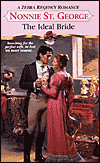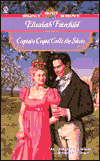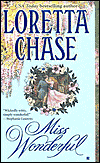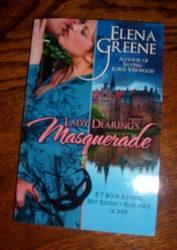 My personal book purchases are almost always based on author. Either I buy books by favorite authors, books by intriguing people I’ve met at conferences or by authors recommended by writer friends. So titles and covers don’t play into my purchases much, but I do have some preferences and pet peeves about titles.
My personal book purchases are almost always based on author. Either I buy books by favorite authors, books by intriguing people I’ve met at conferences or by authors recommended by writer friends. So titles and covers don’t play into my purchases much, but I do have some preferences and pet peeves about titles.
One thing that bugs me (and don’t get me wrong, I’ve enjoyed many books with these titles) is the mass repetition of titles in the romance genre. Just a half-hearted search has turned up loads of books with variants of “ideal/perfect” and “bride/wife”:
- THE IDEAL BRIDE (a fun romp of a trad Regency by Nonnie St. George and a historical by Stephanie Laurens)
- A/THE PERFECT BRIDE (Samantha James, Jo Ann Ferguson, Sheila Walsh, Eileen Putnam, Jasmine Cresswell)
- AN IDEAL WIFE (Betty Neels, Mary Balogh)
- THE PERFECT WIFE (Lynsay Sands, Shari McDonald, Jane Goodger, Victoria Alexander, Mary Burton)
These titles are just so unmemorable (not that the stories are, necessarily). But maybe there’s just something so intriguing about this combination of concepts that keeps these books flying off the shelves. Ditto with all the Regencies with titles including “London Season”. Still, I worry that sameness of titles connotes sameness of stories. I’d rather see more attempts at original titles (while fully recognizing that the authors might not have had a choice in the matter).
 Another pet peeve is titles that are misleading. The worst offender I can think of is a book titled CAPTAIN CUPID CALLS THE SHOTS, by Elisabeth Fairchild. Between the cute title and the rather insipid cover, no one could guess that the story involves a hero with post-war traumatic stress!
Another pet peeve is titles that are misleading. The worst offender I can think of is a book titled CAPTAIN CUPID CALLS THE SHOTS, by Elisabeth Fairchild. Between the cute title and the rather insipid cover, no one could guess that the story involves a hero with post-war traumatic stress!
I rather like Jean Ross Ewing/Julia Ross’s titles, though I find them amusing in a way. THE SEDUCTION, THE WICKED LOVER, NIGHT OF SIN, GAMES OF PLEASURE are titillating titles with their hint of the forbidden, though the stories are more psychological than the titles might imply and the innate message (as in all good sensual romances) is the healing and cleansing power of loving sex. And the covers are so elegant and luscious!
 OK, now to titles I’ve loved. Some of Mary Jo Putney’s: THE RAKE AND THE REFORMER, THE ROGUE AND THE RUNAWAY. They just evoke conflict and adventure and have a nice rhythm. “R” is a sexy letter, too, though maybe as a Risky Regency, I’m a sucker for that particular alliteration. 🙂
OK, now to titles I’ve loved. Some of Mary Jo Putney’s: THE RAKE AND THE REFORMER, THE ROGUE AND THE RUNAWAY. They just evoke conflict and adventure and have a nice rhythm. “R” is a sexy letter, too, though maybe as a Risky Regency, I’m a sucker for that particular alliteration. 🙂
 Loretta Chase’s Regencies had some memorable titles. VISCOUNT VAGABOND and THE DEVIL’S DELILAH. More alliteration (!) but these are also fun, as are her stories. I also like MISS WONDERFUL and MR. IMPOSSIBLE.
Loretta Chase’s Regencies had some memorable titles. VISCOUNT VAGABOND and THE DEVIL’S DELILAH. More alliteration (!) but these are also fun, as are her stories. I also like MISS WONDERFUL and MR. IMPOSSIBLE.
I’ve been fairly lucky myself in having some say in my titles. How about the rest of you Riskies? Have you had to give up a favorite title, or fight to keep it?
As readers, what sort of titles turn you off, or compel you to buy the book?
Elena
LADY DEARING’S MASQUERADE, a Romantic Times Top Pick!
http://www.elenagreene.com/


.jpg)
.jpg)
